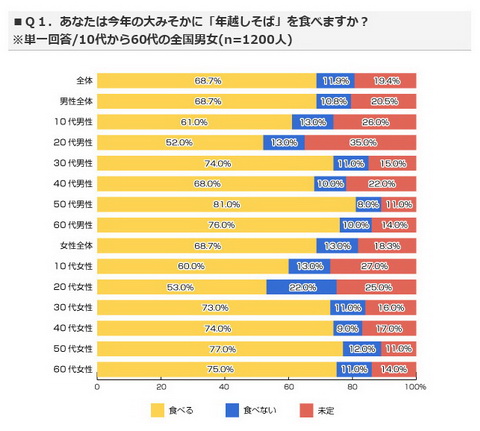
How will you be spending New Year’s Eve this year? Celebrating with family or friends? Watching a countdown on TV? Sleeping, oblivious to the world and perfectly happy about it? Here’s what Japanese respondents on one online poll said they’re be doing when the ball drops, the clock strikes twelve, and the temple bells are rung 108 times.
A total of 1,200 people responded to a poll on Japanese website Life Media, ranging in age from their tens through their sixties. According to the results, the majority of Japanese people will usher in the New Year by staying at home and eating toshikoshi-soba (“crossing over to the next year soba”) and pre-prepared treats like o-sechi ryori (a special feast eaten on New Year’s Day; it’s considered unlucky to cook during the first few days of the new year), o-zoni (special New Year’s soup with a clear broth), and mochi (rice cakes) while reminiscing about 2013.
(It must be nice to be lazy at home and eat food like this o-sechi all day:)
Here are a sampling of the questions and response graphs from the poll.
▼Question 1: Will you eat toshikoshi-soba this New Year’s Eve?
Yellow = will eat; blue = will not eat; red = unanswered
First row: men and women of all ages combined
Second row on: Men listed by age (men of all ages combined, women in their tens, twenties, thirties, etc.)
Ninth row on: Women listed by age (women of all ages combined, women in their tens, twenties, thirties, etc.)
About 69% of people will eat toshikoshi-soba on New Year’s Eve; 53% of whom will eat it for dinner. While the percentage of people in their twenties who will eat the special soba was low, 42% will eat the noodles when the temple bells ring 108 times at midnight (another Japanese custom). Furthermore, 83% of people will eat at home, while only 2% will go out to eat.
In addition, when it comes to o-sechi, only 12% of people said they will make everything from scratch, while 34% said they will cook some things and buy other things. About half of them will prepare o-sechi at home. As for o-zoni, most people prefer their clear soup with square mochi and a hint of soy sauce flavor.
▼Question 2: Where do you plan to spend the end of the year/beginning of the new year?
Yellow = at home; blue=family/relative’s house; red = domestic travel; green = international travel; purple = other
First row: men and women of all ages combined
Second row: men of all ages combined
Third row: women of all ages combined
Next, 78% responded that they will spend New Year’s at home, while about 3% will travel within Japan. 83% will relax at home on New Year’s Eve, and 43% of those will watch special television programs as they count down to midnight. 81% will spend New Year’s Day taking it easy at home, too. Sounds pretty good to us!
▼Question 9: What kind of year was 2013 for you?
Yellow = very good; blue = good; red = so-so; green = bad; purple = very bad
First row: men and women of all ages combined
Second row: men of all ages combined
Third row: women of all ages combined
35% of people said that 2013 was either a good or really good year. Unfortunately, about 6% of them had a bad time in 2013…hopefully they’ll have better luck next year.
Everyone, are you looking forward to 2014? If you don’t already have any New Year’s traditions of your own, why not celebrate this year Japanese style?

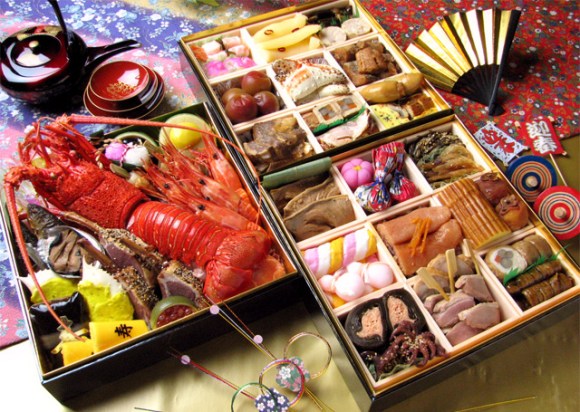
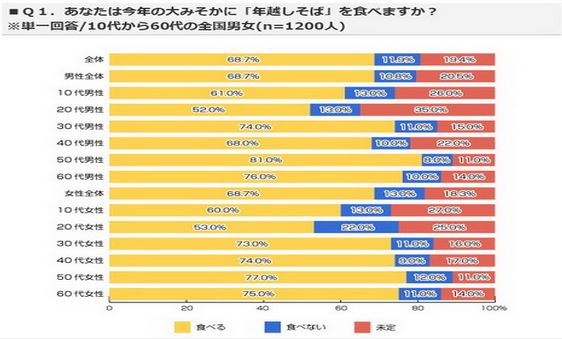
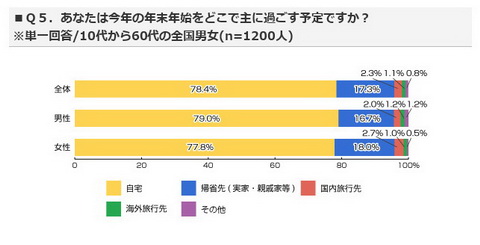
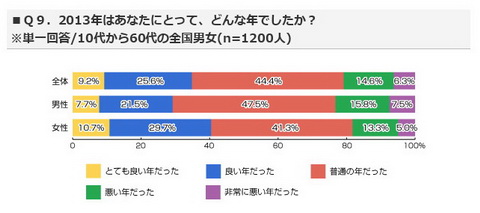
 Survey reveals how Japanese people plan to spend the 2023 New Year’s holiday
Survey reveals how Japanese people plan to spend the 2023 New Year’s holiday Here’s what our bachelor writers ate over the New Year’s holiday in Japan
Here’s what our bachelor writers ate over the New Year’s holiday in Japan What’s the best way to ring in the new year in Tokyo? Try the countdown event at Shibuya crossing
What’s the best way to ring in the new year in Tokyo? Try the countdown event at Shibuya crossing More people travelling in Japan for the New Year’s holiday than last year, survey says
More people travelling in Japan for the New Year’s holiday than last year, survey says New take on traditional Japanese “osechi” is a sweet way to ring in the new year
New take on traditional Japanese “osechi” is a sweet way to ring in the new year The best Hobonichi diaries, covers and stationery for 2026
The best Hobonichi diaries, covers and stationery for 2026 Ramen for 99 yen?!? Best value-for-money noodles found at unlikely chain in Japan
Ramen for 99 yen?!? Best value-for-money noodles found at unlikely chain in Japan Drift ice in Japan is a disappearing winter miracle you need to see now
Drift ice in Japan is a disappearing winter miracle you need to see now Starbucks Japan releases first-ever Hinamatsuri Girls’ Day Frappuccino
Starbucks Japan releases first-ever Hinamatsuri Girls’ Day Frappuccino The fish in rural Fukui that rivals Japan’s most auspicious sea bream
The fish in rural Fukui that rivals Japan’s most auspicious sea bream Development of Puyo Puyo puzzle game for use in nursing homes underway
Development of Puyo Puyo puzzle game for use in nursing homes underway Japan Extreme Budget Travel! A trip from Tokyo to Izumo for just 30,000 yen [Part 2]
Japan Extreme Budget Travel! A trip from Tokyo to Izumo for just 30,000 yen [Part 2] Survey asks Japanese women if they could marry a man who’s rich but ugly
Survey asks Japanese women if they could marry a man who’s rich but ugly Tokyo losing another iconic video game arcade as Ikebukuro landmark is closing for good
Tokyo losing another iconic video game arcade as Ikebukuro landmark is closing for good Japan’s new Pokémon pancake maker hot plate may mean we never cook anything else ever again【Pics】
Japan’s new Pokémon pancake maker hot plate may mean we never cook anything else ever again【Pics】 Japanese restaurant chain serves Dragon Ball donuts and Senzu Beans this spring
Japanese restaurant chain serves Dragon Ball donuts and Senzu Beans this spring Highest Starbucks in Japan set to open this spring in the Tokyo sky
Highest Starbucks in Japan set to open this spring in the Tokyo sky Tokyo Skytree turns pink for the cherry blossom season
Tokyo Skytree turns pink for the cherry blossom season Japan Extreme Budget Travel! A trip from Tokyo to Izumo for just 30,000 yen [Part 1]
Japan Extreme Budget Travel! A trip from Tokyo to Izumo for just 30,000 yen [Part 1] Yakuzen ramen restaurant in Tokyo is very different to a yakuza ramen restaurant
Yakuzen ramen restaurant in Tokyo is very different to a yakuza ramen restaurant Japan has only one airport named after a samurai, so let’s check out Kochi Ryoma【Photos】
Japan has only one airport named after a samurai, so let’s check out Kochi Ryoma【Photos】 Japanese drugstore sells onigiri at pre-stupid era prices, but how do they compare to 7-Eleven?
Japanese drugstore sells onigiri at pre-stupid era prices, but how do they compare to 7-Eleven? Adorable Totoro acorn key holders come with a special guest hidden inside[Photos]
Adorable Totoro acorn key holders come with a special guest hidden inside[Photos] Japan’s newest Shinkansen has no seats…or passengers [Video]
Japan’s newest Shinkansen has no seats…or passengers [Video] Starbucks Japan releases new sakura goods and drinkware for cherry blossom season 2026
Starbucks Japan releases new sakura goods and drinkware for cherry blossom season 2026 Foreigners accounting for over 80 percent of off-course skiers needing rescue in Japan’s Hokkaido
Foreigners accounting for over 80 percent of off-course skiers needing rescue in Japan’s Hokkaido Super-salty pizza sends six kids to the hospital in Japan, linguistics blamed
Super-salty pizza sends six kids to the hospital in Japan, linguistics blamed Starbucks Japan unveils new sakura Frappuccino for cherry blossom season 2026
Starbucks Japan unveils new sakura Frappuccino for cherry blossom season 2026 Foreign tourists in Japan will get free Shinkansen tickets to promote regional tourism
Foreign tourists in Japan will get free Shinkansen tickets to promote regional tourism The 10 most annoying things foreign tourists do on Japanese trains, according to locals
The 10 most annoying things foreign tourists do on Japanese trains, according to locals Take a trip to Japan’s Dododo Land, the most irritating place on Earth
Take a trip to Japan’s Dododo Land, the most irritating place on Earth Naruto and Converse team up for new line of shinobi sneakers[Photos]
Naruto and Converse team up for new line of shinobi sneakers[Photos] Is China’s don’t-go-to-Japan warning affecting the lines at a popular Tokyo gyukatsu restaurant?
Is China’s don’t-go-to-Japan warning affecting the lines at a popular Tokyo gyukatsu restaurant? Survey asks foreign tourists what bothered them in Japan, more than half gave same answer
Survey asks foreign tourists what bothered them in Japan, more than half gave same answer Japan’s human washing machines will go on sale to general public, demos to be held in Tokyo
Japan’s human washing machines will go on sale to general public, demos to be held in Tokyo Starbucks Japan releases new drinkware and goods for Valentine’s Day
Starbucks Japan releases new drinkware and goods for Valentine’s Day We deeply regret going into this tunnel on our walk in the mountains of Japan
We deeply regret going into this tunnel on our walk in the mountains of Japan Studio Ghibli releases Kodama forest spirits from Princess Mononoke to light up your home
Studio Ghibli releases Kodama forest spirits from Princess Mononoke to light up your home Major Japanese hotel chain says reservations via overseas booking sites may not be valid
Major Japanese hotel chain says reservations via overseas booking sites may not be valid Put sesame oil in your coffee? Japanese maker says it’s the best way to start your day【Taste test】
Put sesame oil in your coffee? Japanese maker says it’s the best way to start your day【Taste test】 No more using real katana for tourism activities, Japan’s National Police Agency says
No more using real katana for tourism activities, Japan’s National Police Agency says Survey says osechi New Year’s food differs according to each region in Japan
Survey says osechi New Year’s food differs according to each region in Japan Six non-traditional osechi New Year’s meals in Japan
Six non-traditional osechi New Year’s meals in Japan Mochi continues to be Japan’s deadliest New Year’s food, causes two deaths in Tokyo on January 1
Mochi continues to be Japan’s deadliest New Year’s food, causes two deaths in Tokyo on January 1 The meaning of the mandarin and 6 other Japanese New Year traditions explained
The meaning of the mandarin and 6 other Japanese New Year traditions explained Spending New Year’s alone? Japanese restaurant has special one-person kosechi New Year’s meals
Spending New Year’s alone? Japanese restaurant has special one-person kosechi New Year’s meals Deadly New Year mochi strikes again, hospitalizing 19 and resulting in 4 deaths
Deadly New Year mochi strikes again, hospitalizing 19 and resulting in 4 deaths KFC Japan reveals New Year’s box for 2017, seeks total domination over festive period
KFC Japan reveals New Year’s box for 2017, seeks total domination over festive period Japan’s most dangerous New Year’s food causes death once again in Tokyo
Japan’s most dangerous New Year’s food causes death once again in Tokyo Mochi, the danger of Japanese New Year’s, claims another life, rushes many to hospital
Mochi, the danger of Japanese New Year’s, claims another life, rushes many to hospital No need to be lonely at New Year’s with Japan’s new one-person osechi set【Taste test】
No need to be lonely at New Year’s with Japan’s new one-person osechi set【Taste test】 Awesome Pokémon osechi New Year’s meals elegantly blend Japan’s traditional and pop culture
Awesome Pokémon osechi New Year’s meals elegantly blend Japan’s traditional and pop culture Japan’s deadliest food claims more victims, but why do people keep eating it for New Year’s?
Japan’s deadliest food claims more victims, but why do people keep eating it for New Year’s? You can enjoy traditional Japanese New Year’s osechi eats on a budget with Lawson Store 100
You can enjoy traditional Japanese New Year’s osechi eats on a budget with Lawson Store 100 Happy New Year, manga fans: Artists share their one-of-a-kind New Year’s cards on Twitter
Happy New Year, manga fans: Artists share their one-of-a-kind New Year’s cards on Twitter Celebrate the New Year with a special and limited edition Barbie bento box of New Year foods
Celebrate the New Year with a special and limited edition Barbie bento box of New Year foods Lucky Japanese new year ice cream! Baskin-Robbins’ flavor inspired by traditional osechi cuisine
Lucky Japanese new year ice cream! Baskin-Robbins’ flavor inspired by traditional osechi cuisine